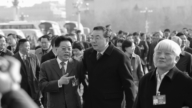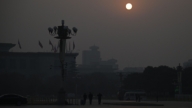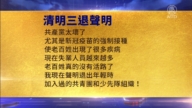【新唐人2012年11月21日讯】中共总书记习近平首次主持中央政治局会议,会中谈到反腐问题时说:“物必先腐,而后虫生”,最终必然会“亡党亡国”。法新社评述说,习近平使用了不同寻常的直截了当的语气来揭露党内腐败现象。也有评论指出,新官上任三把火,第一把烧的就是腐败现象。然而中共历任领导喊了几十年的反贪腐口号,呼声越高腐败似乎越猖獗。
新上任的中共总书记习近平,在十八届中共中央政治局第一次的讲话,他谈到中国共产党面临着严重的腐败问题。他说“腐败问题越演越烈,最终必然会亡党亡国”。
对此,中国问题专家赵远明表示,中国会亡党,但不可能亡国。
中国问题专家赵远明:“中国有五千年的文明历史,虽然朝代在不断的更替,但是这个国家并不会亡,中国人民在这块土地上生、养、繁、息,那么这个国家还会在,可能你共产党垮了,会有另外一个党派或者是另外一个新政府取代。”
在会议上,习近平形容腐败是“物必先腐,而后虫生”,意思是中共的腐败,根源在于自身﹔如果亡党亡国,根源也在中共自己。他还强调,近年来中共党内发生的严重违纪违法案件,“性质非常恶劣,政治影响极坏,令人触怵目惊心”。
时政事评论员伍凡:“共产党你一个头头,一个总书记,天高皇帝远,你能管的了下面吗?你连个省市很多问题你都解决不了,因为这个就是政治利益和经济利益的分配,中共已经走到什么?这个诸侯庞大起来了,中央的皇帝管不了了。”
中国历史学者李元华认为,几十年来,中共走的路线始终如一,所谓的把经济搞活,其实就是养肥了一群腐败官员,制造了世界上最大的既得利益群体。如今民怨高涨,执政者为了让老百姓减轻一些怨气,或者打击自己的政敌时,才会去严厉的治理贪腐。
中国历史学者李元华:“实际上整个中国社会在中共统治下,已经走入了恶性循环,如果从个人来讲,可能有这种所谓反贪、反腐的意愿,但是在整个体制下根本就反不了,而且事实已经证明根本也是反不了,任何一个人出台所谓贪腐的…,到最后都会不了了之。”
习近平提到防治腐败,高阶干部既要严于律己,又要加强对亲属和身边工作人员的教育和约束,绝不允许以权谋私、搞特权,对一切违纪、违法行为必须严惩不贷,绝不能手软。
现在大家最关注的,莫过于前重庆市委书记薄熙来,未来可能会被以腐败和滥用权力的罪名审判。
中国历史学者李元华:“这样对老百姓来讲,听着好像冠冕堂皇,好像共产党还是整治贪腐的,但实际是他把自己的政敌打下去了,或者说中国官员人人在腐败,人人在搜集对方的腐败材料,作为自己能够继续腐败不被对方打倒的一张牌,这已经成为中共官场的普遍现象。”
外界认为,中共的反腐三部曲,第一,坚决反腐﹔第二,腐败是由制度导致的﹔第三,制度坚决不改。李元华表示,中国司法不独立,只要一党专政还在,那么腐败依然会持续下去。
采访/李韵 编辑/黄亿美 后制/郭敬
Xi Jinping recognizes the shocking corruption
CCP General Secretary Xi Jinping, while presiding over
the first meeting of CCP Political Bureau,
mentioned anti-corruption issues and the danger of CCP
ruin with the analogy, “rotting first, then worms.”
Agence France-Presse observed that Xi Jinping exposed
CCP corruption with an unusual, straightforward tone.
Other observers also mentioned Xi Jinping exposed
the corruption issues as soon as he took office.
CCP successive leaders have called
for anti-corruption measures for decades.
However, it seems the louder the voice,
the more the corruption.
The newly appointed CCP General Secretary, Xi Jinping,
mentioned the serious CCP corruption problem in his first
speech of the eighth session of the CCP Political Bureau.
“The serious corruption problems may lead to CCP ruin
ultimately,” he said.
In this regard, Zhao Yuanming, an expert of China issues,
said the CCP will die, but China will not.
Zhao Yuanming: “China has a five thousand year history
of civilization.
Although the dynasties have constant turnover,
the country does not perish.
Chinese people are born and live on this land,
therefore, the country is still there.
The CCP may collapse, but there will be another partisan
or a new government to replace it.”
In the meeting, Xi Jinping used, “rotting first, then worms”
to describe the corruption issues.
He pointed out that the current CCP corruption
and future disintegration is rooted in the CCP itself.
He also referred to serious cases within the CCP recently
as, “very bad in nature, very touch shocking with bad political influence.”
Politics critic Wu Fan: “Can the CCP General Secretary
really control the local governments?
They can hardly deal with the local issues, especially
the distribution of political and economic interests.
The situation in China is that local officials
are getting stronger and disobedient.”
Li Yuan Hua, a Chinese historian thinks the CCP keeps
following one route, the so-called enlivening the economy, consistently for decades.
In fact, the policy has fattened a group of corrupt officials and
manufactured the world’s largest gang with vested interests.
Grievances are currently rising, therefore, those in power plan
to control corruption in order to alleviate some of the grievances or go against their political opponents.
Li Yuanhua: “In fact, the entire Chinese society has entered
into a vicious cycle based on the CCP rule.
There may be personal willingness for anti-corruption,
instead of institutional willingness.
The facts show that anyone within the CCP who introduces
anti-corruption policies will fail in the end.”
When Xi Jinping mentioned anti-corruption issues, he called
on senior officials to be self-disciplined and pay attention to their relatives and staff.
He asked the senior officials to stop the abuse of power
and mentioned that all violations must be punished.
The most concerned person may be the former Chongqing
Secretary Bo Xilai, who may face trial for corruption and abuse of power in the future.
Li Yuan Hua, a Chinese historian: “So in terms of the common
people, the CCP is dealing with corruption seriously with lofty-sounding words.
In fact, they just go against their political opponents.
In another word, every CCP official is involved in corruption
and they are collecting the corruption cases from each other
as a bargaining chip to protect themselves.
This is a common phenomenon in CCP officialdom.”
The outside world views the CCP as having an
anti-corruption trilogy.
First, resolute anti-corruption campaigns, second,
the system causes corruption, and third, the system is determined not to change.
Li Yuanhua thinks corruption will continue
if the Chinese judiciary is not independent and maintains a one-party dictatorship.




























